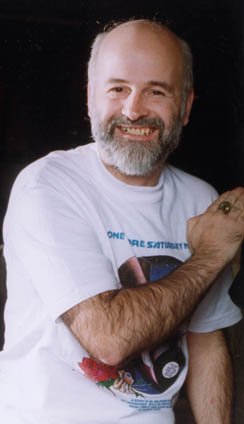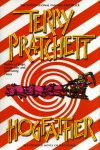
|
T
E R R Y
P
R A T C H E T T : Discworld & Beyond
(excerpted from Locus Magazine, December 1999) | ||
 Photo by Beth Gwinn |
Terry [David John] Pratchett was born April 28, 1948 in Beaconsfield, Bucks., UK, and attended High Wycombe Technical High School, where his story ''The Hades Business'' appeared in the school magazine when he was 13, and commercially in Science Fantasy just two years later. Colin Smythe published humorous fantasy The Carpet People in 1971, and then humorous SF The Dark Side of the Sun (1976) and Strata (1981). His first Discworld book, The Colour of Magic, appeared in 1983, followed by The Light Fantastic in 1986. By the '90s, his books had become bestsellers, as well as generating numerous spin-offs – a cartoon series, Discworld computer games, desk diaries, non-fiction guides and maps, and dramatic adaptations of various books by Stephen Briggs. Good Omens (1990), a non-Discworld collaboration with Neil Gaiman, has also been very popular, and a film adaptation is in the works. His YA SF series ''The Bromeliad'' has three books of the ''Nomes'' – Truckers (1989), Diggers (1990), and Wings (1990). The 24th Discworld book, The Fifth Elephant, has just appeared in Britain, with a US edition to follow. Pratchett and wife Lyn (they married in 1968) are the parents of daughter Rhianna. He received a 1989 British Fantasy Award (best novel) for Pyramids, an O.B.E. in the Queen's Honours of 1998, and an honorary Doctor of Letters degree from the University of Warwick in 1999. |
|
|
''Discworld started as an antidote to bad fantasy, because there was a big explosion of fantasy in the late '70s, an awful lot of it was highly derivative, and people weren't bringing new things to it. The first couple of books quite deliberately pastiched bits of other writers and things – good writers, because it's the good ones most people can spot: 'Ah, here's the Anne McCaffrey bit.' I was rapidly stitching together a kind of consensus fantasy universe, and the one trick was, 'Let's make people act.' I remember a description Mad magazine did about The Flintstones: 'dinosaurs from 65 million years ago, flung together with idiots from today.' I tried to do something like that with Discworld. Not everyone on Discworld is entirely a modern character, but they are recognizable to us. Their concerns are more like 20th-century concerns. But they also seem to me to be aware – I've invented things like 'narrative causality,' which practically says, 'the characters know that they are in a story.' What they do know is that they have roles to play.
''I make notes all the time. Writing the Discworld novels is almost a kind of journalism. It may be journalism that takes place two or three years after the fact, but the last 10 books maybe, have been subtly influenced by moderately current affairs ''In Jingo, one of the things I wanted to explore was just how quickly apparently peaceful populations can be persuaded to go to war. A friend of mine who has a French wife asked her, on my behalf, how long it would take to get France and England to go to war, and she said, 'About 20 seconds.' ''I have no great hopes of space habitation. Too many things can go wrong. The nice thing about planets is, comparatively small things can go wrong, and checks and balances come into play. I'm not quite certain how you do that on a moon base. Remember, I worked for eight years in the nuclear industry. I know that if you put a handle on a door and mark it 'Pull,' six people will pull, three will push, and one will say, 'Do you want me to pull or push?' I would hate to have to bank the human race's survival on a generation ship, because when it was being constructed, some guy at some point was anxious to get off early on a Friday afternoon, and something he didn't do then, some washer he didn't put on, is just going to be lurking there for a few hundred years, until finally the nut drops off and the screw falls out, and the piece of cladding comes loose, and another wire presses against a second wire – and suddenly you're going around in circles! ''On the other hand, it's worth a try, because there's nowhere else to go, and the planet will be made uninhabitable no matter what we do. But the optimistic side is this: To the universe, it doesn't matter if we live or die, but it does matter to us. We have invented the concept of things mattering. It does not matter to Mother Nature whether tigers live or die. Millions of species have lived and died, and some of them were – in our eyes – thoroughly worthy of living. But that doesn't matter, when a damn great rock slaps into the planet. I like humanity. I would quite like to see us continue. ''We're living in science fiction, but we don't realize it. I was buying something for my wife in Perth, Australia, last time I was on tour. I couldn't remember her size, so I phoned her up. (The time zones are about right.) So I was standing in this shop, saying, 'Would you prefer it in blue or green?,' and we were chatting and so on. That is a science fiction conversation! All the more so for being mundane. I'm actually making a phone call all around the world with my mobile phone, to ask my wife her dress size! ''I have completed the 24th 'Discworld' novel, The Fifth Elephant, and now I'm working on the 25th. Currently, my plan is to take a brief break from Discworld after the 25th, and do some other things I have in mind, but I do know that there are two more Discworld stories I really would like to do. In fact, the one I'm working on at the moment could be buddied, if I was doing what I call Draft Zero, which is the one where you just put down more or less anything. You've rammed the clay onto the potter's wheel, and you're probing to see what shape it's going to be, and it rapidly divided into two stories. For a while, I was writing them in parallel, to see if they connected at any point, and they wouldn't, so it's very nice to know I've got the seed of another novel just sitting there. So I know where two books are, as it were, which gives me a nice, warm feeling. ''I no longer read the two Pratchett news groups online. There is one major reason, and one minor reason. The minor reason is, there's only so many times you can smile when a book is being deconstructed by someone that thinks Star Trek, the Next Generation is an old TV series, and has no real sense of history at all. The big reason is that the Internet had changed things. Once upon a time, everybody knew the rules. It was part of playing the game, that you knew the rules. For science fiction, in a sense, fandom is a socially acceptable copyright infringement – and I'm saying this as someone who rode somewhat on the periphery and thought like a fan since he was 13. In the early days of Star Trek, fannish activity was positively encouraged. The wise author 'didn't know' that it was happening, and everything worked because everyone involved knew where the limits were. The Internet has changed all that. ''The Internet community is kind of fannish. It looks like fandom. It has the same shape as fandom, but I don't think it has the same base or solidarity. What has depressed me beyond measure is that here we have a medium which, no matter what Mr. Gates has succeeded in doing, is text-based. Never has there been a time when it's become more necessary to write so clearly and succinctly, or indeed to read with a great desire for understanding, because the words are all there are. It's a shame that large areas of the net have become colonized by people that think dyslexia, rather than being an affliction, is a kind of badge of coup. While the net may be leading to an upsurge in creativity, it may also be building a huge electronic slush pile.'' |
| © 1999 by Locus Publications. All rights reserved. |





